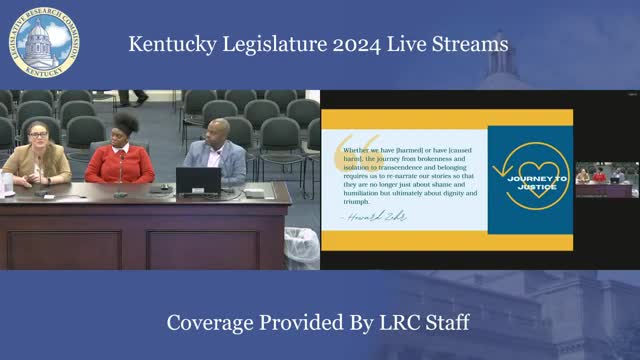Restorative justice transforms lives through healing conversations
June 22, 2024 | Department of Juvenile Justice, Justice, Governor's Secretary of the Cabinet, Organizations , Executive, Kentucky

This article was created by AI summarizing key points discussed. AI makes mistakes, so for full details and context, please refer to the video of the full meeting. Please report any errors so we can fix them. Report an error »

In a recent government meeting, discussions centered on the transformative potential of restorative justice practices, particularly in the context of youth offenders. Advocates highlighted that restorative approaches not only prioritize the needs of victims but also offer a more cost-effective alternative to traditional incarceration methods.
One poignant testimony came from a participant who shared her personal experience with the justice system as a teenager facing severe charges. She recounted her time in solitary confinement and the lack of opportunities for accountability or remorse within the conventional legal framework. This individual emphasized that her encounter with the family of a victim led to a profound moment of healing, illustrating the power of direct communication and empathy in addressing harm.
The family, rather than seeking further punishment, expressed a desire for the young woman to acknowledge her role in the tragedy and to show remorse. This interaction, described as more impactful than years spent in the traditional system, underscored the importance of personal connection and understanding in the healing process for both victims and offenders.
The meeting underscored a growing recognition of restorative practices as a viable path forward, advocating for a shift in how society addresses crime and its consequences. Participants expressed a commitment to further exploring these methods, aiming to foster environments where accountability and healing can coexist, ultimately benefiting all parties involved.
One poignant testimony came from a participant who shared her personal experience with the justice system as a teenager facing severe charges. She recounted her time in solitary confinement and the lack of opportunities for accountability or remorse within the conventional legal framework. This individual emphasized that her encounter with the family of a victim led to a profound moment of healing, illustrating the power of direct communication and empathy in addressing harm.
The family, rather than seeking further punishment, expressed a desire for the young woman to acknowledge her role in the tragedy and to show remorse. This interaction, described as more impactful than years spent in the traditional system, underscored the importance of personal connection and understanding in the healing process for both victims and offenders.
The meeting underscored a growing recognition of restorative practices as a viable path forward, advocating for a shift in how society addresses crime and its consequences. Participants expressed a commitment to further exploring these methods, aiming to foster environments where accountability and healing can coexist, ultimately benefiting all parties involved.
View full meeting
This article is based on a recent meeting—watch the full video and explore the complete transcript for deeper insights into the discussion.
View full meeting
